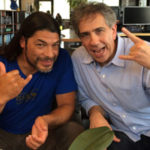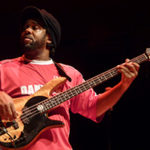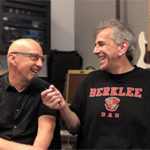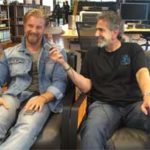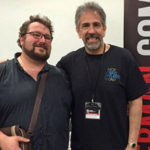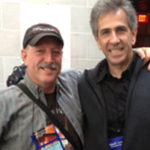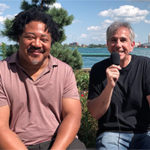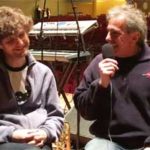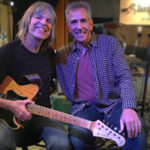Israeli bassist on his musical journey and thoughts on bass chops
Exclusive interview with FBPO’s Jon Liebman
June 28, 2021
Guy Bernfeld is the sort of bassist who has no trouble shifting gears between a thrashy metal song, an improvised jazz piece, or a classical suite. The native Israeli is an alumnus of Berklee College of Music and the Rimon School of Music, with over 15 years of experience as a touring and studio musician. During that time, he’s worked with a variety of musicians and groups, including Mike Stern, Tigran Hamasyan, The Living Tombstone, The Gag Quartet, Jesús Molina, Anakdota, Pie Q, and Carmel Apple Pop.
FBPO: How did you become a bass player?
GB: Hmm, that’s a good one. I started probably like many bass players… I wanted to play guitar a little bit and, to be honest, I just kind of hated the pick. My dad, who used to be a musician, told me, “Hey, how about you just play with your fingers? How about just trying bass?” And I tried it and I loved it and it was just so much fun. I was quickly introduced to Victor Wooten and Jaco Pastorius, and that’s why I really fell in love. I’m like, “Oh, this is just too cool, all the groove stuff.” I was about 14 when that happened.
FBPO: Who were some of your other influences?
GB: Well, that’s a tricky question. I know it shouldn’t be, but I don’t really have that many bass influences. I got inspired by are people like Michael Brecker, like Tigran Hamasyan, Chick Corea. And for bass, I have a lot of people I really like, but not people whose stuff I try to take into my own playing that much. There’s obviously Hadrien Feraud, who’s like something else. He’s insane. Federico Malaman from Italy. He’s amazing. There’s a Brazilian bass player called Júnior Braguinha. For me, he’s like the top, up there with people like Hadrien. Also Anton Davidyants and many, many other really great bass players that influence me today. When I see their videos, I’m like, “Okay, I’m picking up my bass and I’m shedding!”
FBPO: What made you pack up and move to Boston to go to Berklee? Did you have a specific career goal in mind when you went?
GB: You know, ever since I was younger, I dreamt about making music as an actual career. Not just to survive, but a good career. I was in a music program in my high school that had a credit transfer to a college in Israel that had credits that transferred to Berklee. So, technically, I started my journey to Berklee already in high school. I already tested out of Berklee classes in my high school music classes. And I also was in a young musician program when I was 17 and 18 that had Berklee faculty come to Israel and give some classes for a week, so I already had the Berklee thing in mind.
FBPO: Was it strictly bass faculty or other music faculty?
GB: No, it was just music, like youth music program. It was very cool. It was very cool to do when you were young. And the idea of Berklee stuck with me. When I finished college in Israel, I realized that, “Okay, I can audition and I’m just going to try it out, see how it goes.” And I got the good scholarship and I’m like, “Okay, I’m going!” I can’t even explain how important that decision was for my life. I met such amazing musicians; I had such amazing opportunities. It’s really incredible where my life has gone since Berklee College of Music, so I’m super happy I made that decision, for sure.
FBPO: Who were your bass teachers at Berklee?
GB: For my first one, I had Bruce Gertz. He’s a great bass player.
FBPO: I love Bruce!
GB: Yeah. He’s awesome. He’s such a sweet guy. I had Lincoln Goines, who was also incredible. He was a lot of fun. I didn’t take that many bass classes because I didn’t major in performance, but I did have one my last semester, with James Genus, which I was super happy for because this was his first semester teaching anywhere ever. We had a lot of fun. We jammed a lot, we talked about Michael Brecker all the time and he just told me stories. Sometimes that’s the best way for me to learn, more than exercises.
FBPO: Do you think there’s a resurgence of interest in chops, like when Jaco and Stanley and those guys first came on the scene a couple generations ago?
GB: That’s super interesting, actually, because yeah, chops is one thing for sure. But I think what all these guys have in common is musical chops. They’re not just playing as fast as they can, just going up and down scales or chromatic (runs). If you slow down like either Jesús (Molina) or definitely Hadrien’s solos, every note makes sense. And it just seems so fast. How can anyone think this quickly? It’s engaging. There is an entertaining aspect of like, “Wow, this is so crazy, so impressive,” but it’s just also refreshing. And now with the whole way social media has taken over, I feel like it’s easier because people like Jesús, when he makes a video of 30 seconds of playing something crazy, sometimes it’s more engaging than listening to a whole album and having that one crazy moment, like 10 minutes in. I love listening to albums, don’t get me wrong, but there’s something that I can see, why the younger generation is more into it. It’s like fast, in your face, and it’s fun. It’s entertaining. I get it.
FBPO: Tell me about your gear.
GB: Actually, I don’t use a lot of things at all. I use some pedals every now and then, but generally I just use my fingers. I have a Mayones Jabba Custom 5-string. I just started working with Mayones a year ago. I’m really happy about this collaboration because they make incredible instruments. My bass has something in between the Fender vibe into more of the modern kind of basses for fusion and, like, production kind of bass playing.
FBPO: One would normally assume that when someone says, “5-string,” they’re talking about a Low B. Every once in a while, though, it’s a high C. Which is yours?
GB: It’s a Low B. It’s funny because I used to play, my entire career basically, until last year, on a 6-string Ibanez BTB bass. That was my bass for every video anyone has ever seen with me playing until a year ago. So, I’m used to the high C string, but I wanted a change of pace a little bit because I didn’t want to be labeled as that 6-string player. I wanted to do my thing and to have some different options of sound and also a different way of thinking. You think differently on the 5- and 6-string basses. I would play the same song completely differently. It’s really crazy. Other than that, I don’t really have any specific gear in mind. I’m using Pitbull strings. I started working with them a year ago. Because I lived in the US for so long and I kept moving, and now I’m in Israel, and I’m just using the sound system. I plug in directly. Whenever I decide where I’m moving and staying in one place, maybe I’ll get a MarkBass or something. I’ll figure it out.
FBPO: What’s keeping you busy these days?
GB: I’ve been producing an album for a sitar player from India called Purbayan Chatterjee. His album has incredible, incredible guests, like Michael League on several songs. We have Antonio Sanchez, we have Béla Fleck, we have Anat Cohen, and Jordan Rudess. It’s a really crazy experience that’s been keeping me (busy) for a while, so I haven’t even posted that much bass-related content. I just have to switch from my “producer” mind to my “bass player” mind.
FBPO: I assume this is all happening remotely?
GB: Yeah, everything is remote. I’ve been also recording some stuff for some people, sometimes just audio with video. I’ve been teaching, and I’m starting to work on my own music. I’ve been kind of postponing that for quite a while, but I feel like now’s the time. People keep asking me, “Where’s your music?” Like, “Okay, you want it? I’ll get it to you!” So probably 2022, there will be an album out.
FBPO: What advice do you have for someone who wants to learn bass?
GB: There are a few rules, in my opinion, for practicing or improving on bass. First of all, you have to figure out how to play as comfortably as you can, without any pressure, or any way of hurting yourself. It’s really important to get to a point where you are comfortable with the way you play, and then you can push your limits forward. People sometimes play in an incorrect way that gives them pressure on their hands. That’s a big barrier you want to get out of the way quickly. For the learning experience, I wasn’t practicing bass that much growing up. I was one of the more lazy bass players! I didn’t sit and practice for hours and hours a day; I just practiced specific things I had to learn, or I wanted to learn for fun. But the main, main thing that I think got me to where I am is playing with people all the time. That was 100% the main one. Being around musicians who are better than me, that’s the most important (thing). Always play with people who are better than you. Don’t be scared to get some criticism or to feel like you’re the worst one. It’s fine because the benefits of that are in indescribable, really. Play with people, like different genres, different groups of people, as much as you can.
FBPO: What would you be if you weren’t a bass player?
GB: Man, it’s been my life ever since I can remember, so that’s a really tough one. In a perfect world, I would be a gamer. I always loved that. I’m trying to get in the gaming industry as a musician and I have some connections there, so that’s a big one. That could be fun. Probably I would have been like, I don’t know, like a software engineer or something like that because I like technology and like thinking about stuff.
See Jon’s blog, with key takeaways from this interview here.

